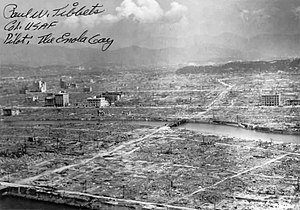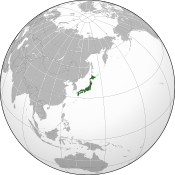Hiroshima marks 65th atomic bombing anniversary
Saturday, August 7, 2010

The 65th anniversary of the first use of an atomic bomb against people has been remembered in a ceremony Thursday in Hiroshima, Japan.
The atomic bomb, code-named "Little Boy", was dropped on Hiroshima at precisely 08:15 local time on August 6, 1945 by the specially converted United States Army Air Force B-29 Superfortress bomber Enola Gay piloted by Colonel Paul Tibbets, who later retired as a brigadier general in the United States Air Force.
Diplomats from 75 countries attended this anniversary including the United States, United Kingdom and France for the first time. United Nations secretary-general Ban Ki-moon, who was also attending this ceremony for the first time said "Together, we are on a journey from ground zero to global zero — a world free of weapons of mass destruction, and that is the only sane path to a safer world. For as long as nuclear weapons exist, we will live under a nuclear shadow."
U.S. Ambassador to Japan John Roos also attended, marking the first time that a U.S. representative has attended the ceremony. Meanwhile, some conservatives in the United States have criticised the choice for Roos to attend. Gene Tibbets, the son of retired Brigadier General Tibbets said on Fox News, "It's making the Japanese look like they're the poor people, like they didn't do anything. They hit Pearl Harbor, they struck us. We didn't slaughter the Japanese. We stopped the war."
Three days after Hiroshima, another atomic bomb, "Fat Man", was dropped on nearby Nagasaki. The Japanese Government surrendered unconditionally on August 15, and signed the formal surrender on the USS Missouri on September 2 in Tokyo Bay.
Approximately 140,000 people died within days from the initial blast of the Hiroshima bomb and during the following year from radiation. The total death toll was almost half of Hiroshima's population.
Sources
- "Ceremony to mark Hiroshima 65 years on" — BBC News, August 6, 2010
- Brooke Elliott. "Hiroshima anniversary brings U.N. head's call for disarmament" — CNN, August 6, 2010
- Justin McCurry. "John Roos is first US representative to attend Hiroshima memorial ceremony in Japan" — The Guardian, August 6, 2010




